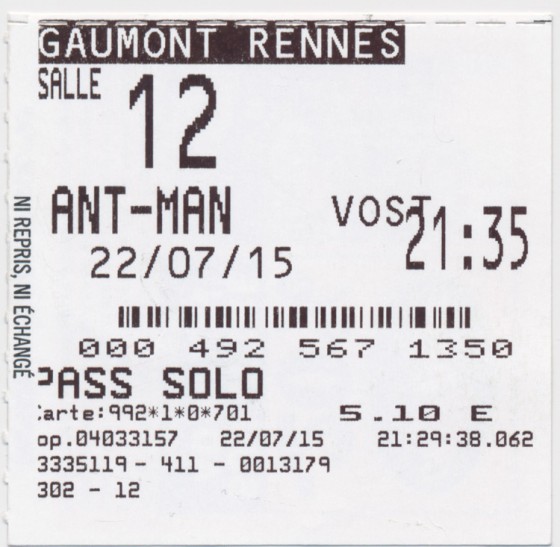Ant-Man

We had our child. We don’t have to raise it, do we?
Ant-Man, summed up as a film that wasn’t as clever as it thought, feels like a kind of fin-de-Marvel exhaustion. I didn’t like watching it, but its existence portends an insane unconscious classic in the works, the kind of unjustified we can do anything confidence that gave us a Sgt. Pepper’s Lonely Hearts Club Band, or, risking the God’s wrath, a Hudson Hawk. I look forward to that, and a little bit down on Ant-Man.

Nevertheless, a modicum of rant for the weird pretzel turns it does re: father/daughter (bigger-slash) parent/child relationships. You’re not going to see it, so:
A damned impressive CGI facelifted Mr. Michael Douglas (seriously, worth tuning in for the first 5 minutes, then do what you want. Nevermind, do what I want – turn it off) invents a shrinky suit. Thirty years on, wants to steal the plans for it to keep it out of the wrong hands. Not the most inventive story, but if you entertain me, I don’t care. In this case, I cared.
Mr. Douglas passes over his daughter, Ms. Evangeline Lilly, fully able and trained to use said shrinky suit and, through various convolutions that turn out to be convolutions, recruits a perfect stranger for the heist. Fine, I guess. But why Mr. Rudd? Not because he’s a thief, weirdly, because the heist requires skills that he must learn in a montage, skills which, again, Ms. Lilly already possesses. Not because he has some convenient genetic marker where he’s the only one that can use the suit. That’s right; I would have preferred coincidence.
Mr. Rudd's character is given sympathy by default, but in that convenient way of the Villain pulling the gun after being arrested so that our Hero can shoot him down and not feel guilty for doing the thing he conjured the Villain for in the first place. I mean, um, morality!
No, it’s because, Mr. Rudd seemingly unlike anyone else in the world, also has a daughter, and deserves a second chance. By inductive reasoning – I select you because you have a daughter, I selected you instead of anyone else – there can be only one person on earth with a daughter, and that person is Mr. Rudd. Hmm.
Likewise, we learn that Mr. Douglas’ wife also had a shrinky suit, and disappeared because she went molecular, and was unable to return from the sub-atomic world. Being that she sacrificed herself to save the world, Mr. Douglas keeps this a secret from his own daughter. This is because he didn’t have one. Or that he deserves a second chance. But he couldn’t because only Mr. Rudd has a daughter.
It should come as no surprise that Mr. Rudd must go molecular at the climax, the no surprise difference being that he returns. The reason he comes back is straightforwardly scientific: he heard his daughter’s voice. In theory, Disappeared Mom had a daughter too, but again, because Mr. Rudd is the only person in the world with a daughter, I guess she didn’t have one after all.
All this lazy motivation (having children explains everything) is fine, I suppose, and would go unnoticed in a better written and directed film. Possibly. In the age of hyper (you don’t get to call it that) feminism, we see female characters relegated more and more to hostages and whiners. I don’t think that it’s a coincidence that in the age of the Child, we see children existing as pawns and motivators.
It should not surprise you that I am not a huge member of the Children fan club. They’re selfish, and should be. I don’t like them because only I get to be. I do, however, like children characters. They’re in movies, where everything is at a nice safe distance.

Still, got finally to theater 12, which gives you an idea of what the French thought of the chances of this film.
‘Characters’, though, is a tricky word. It shouldn’t be, but it is. At the end of the film, one has a cast of characters, even if they don’t do anything, have stakes in anything, or, for that matter, even have a definable typeage. I’m thinking of Newt, naturally, but also any kid from pre-now Pixar, or, Mr. John Hughes, or, especially Mr. Macaulay Culkin from The Good Son.
There is a difference between someone with a definable personality and an object, not unlike many female characters these days, that exist as a prize, or worse still, a badge. Ultimately, even that is fine, since not every one-line character can have a back-story even if they should. But this father/daughter stuff comes off as a bit of a fetish. Mr. Rudd’s character is given sympathy by default, but in that convenient way of the Villain pulling the gun after being arrested so that our Hero can shoot him down and not feel guilty for doing the thing he conjured the Villain for in the first place. I mean, um, morality! The distance I enjoy from watching children safely from the screen is not so far off from the distance our movie characters enjoy, the I would totally give up all my superhero adventures for full custody and changing diapers, and listening to endless stories and tantrums. Totally way I would. Or, getting back to the title…
I’ve given him a daughter. I don’t have write anything do I?
The Take

-$2.00
The Lonely Comments Section

 [logo]
[logo]